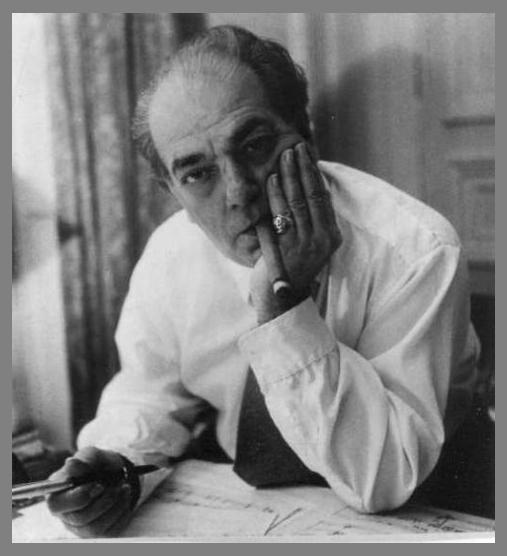 Heitor Villa-Lobos
Heitor Villa-Lobos
Heitor Villa-Lobos: The Maestro Behind "O Trenzinho do Caipira"
Heitor Villa-Lobos, a pioneering Brazilian composer, conductor, and educator, left an indelible mark on the world of classical music. His composition, "O Trenzinho do Caipira" (The Little Country Train), became an enduring anthem of Brazilian folklore.
Early Life and Influences:
Born in Rio de Janeiro in 1887, Villa-Lobos displayed an affinity for music from a young age. He studied the guitar, cello, and clarinet, immersing himself in the vibrant street music of his hometown. The rhythms and melodies of Brazilian folk music would profoundly influence his later compositions.
Musical Journey:
In 1922, Villa-Lobos embarked on a European tour that brought international acclaim to his work. He performed his compositions in Paris and other major cities, introducing European audiences to the unique sounds of Brazil.
Challenges and Controversies:
Villa-Lobos's innovative style was not without critics. Some accused him of departing too far from classical tradition, while others questioned the authenticity of his Brazilian influences. Despite the detractors, Villa-Lobos remained steadfast in his belief that Brazilian music had a place in the concert halls of the world.
"O Trenzinho do Caipira":
Villa-Lobos composed "O Trenzinho do Caipira" in 1930, inspired by the humble steam locomotives that traversed the Brazilian countryside. The piece captured the rhythm and movement of the train with its syncopated melodies and chugging bass line. It quickly became a beloved folk song, performed by countless musicians and singers over the years.
Discography:
Villa-Lobos's vast discography includes numerous orchestral works, concertos, chamber music, and operas. Some of his most notable works include:
* Bachianas Brasileiras (1930-1945)
* Choros No. 10 (1926)
* Symphony No. 9 (1953)
* The Discovery of Brazil (1937)
Legacy:
Heitor Villa-Lobos died in 1959, leaving behind a legacy as one of the greatest composers of the 20th century. His music continues to inspire and captivate audiences worldwide, and his influence can be seen in the works of countless composers and musicians.
Members of Heitor Villa-Lobos's Ensemble:
The exact membership of Villa-Lobos's ensemble varied over time. Some of the notable musicians who performed with him include:
* Jesuína Brázia (soprano and pianist)
* Francisco Mignone (pianist and composer)
* Albertina Fortuna (soprano)
* Laurindo Almeida (guitarist)
Heitor Villa-Lobos, a pioneering Brazilian composer, conductor, and educator, left an indelible mark on the world of classical music. His composition, "O Trenzinho do Caipira" (The Little Country Train), became an enduring anthem of Brazilian folklore.
Early Life and Influences:
Born in Rio de Janeiro in 1887, Villa-Lobos displayed an affinity for music from a young age. He studied the guitar, cello, and clarinet, immersing himself in the vibrant street music of his hometown. The rhythms and melodies of Brazilian folk music would profoundly influence his later compositions.
Musical Journey:
In 1922, Villa-Lobos embarked on a European tour that brought international acclaim to his work. He performed his compositions in Paris and other major cities, introducing European audiences to the unique sounds of Brazil.
Challenges and Controversies:
Villa-Lobos's innovative style was not without critics. Some accused him of departing too far from classical tradition, while others questioned the authenticity of his Brazilian influences. Despite the detractors, Villa-Lobos remained steadfast in his belief that Brazilian music had a place in the concert halls of the world.
"O Trenzinho do Caipira":
Villa-Lobos composed "O Trenzinho do Caipira" in 1930, inspired by the humble steam locomotives that traversed the Brazilian countryside. The piece captured the rhythm and movement of the train with its syncopated melodies and chugging bass line. It quickly became a beloved folk song, performed by countless musicians and singers over the years.
Discography:
Villa-Lobos's vast discography includes numerous orchestral works, concertos, chamber music, and operas. Some of his most notable works include:
* Bachianas Brasileiras (1930-1945)
* Choros No. 10 (1926)
* Symphony No. 9 (1953)
* The Discovery of Brazil (1937)
Legacy:
Heitor Villa-Lobos died in 1959, leaving behind a legacy as one of the greatest composers of the 20th century. His music continues to inspire and captivate audiences worldwide, and his influence can be seen in the works of countless composers and musicians.
Members of Heitor Villa-Lobos's Ensemble:
The exact membership of Villa-Lobos's ensemble varied over time. Some of the notable musicians who performed with him include:
* Jesuína Brázia (soprano and pianist)
* Francisco Mignone (pianist and composer)
* Albertina Fortuna (soprano)
* Laurindo Almeida (guitarist)